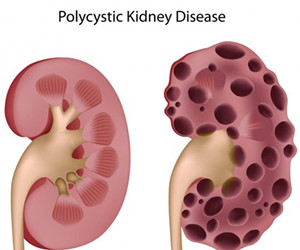Whatsapp: +8615512139310
- Email us:
 PKD is a kind of genetic kidney disease. The kidneys of sufferers grow many cysts, make the renal volume increase rapidly and cause kidney function decline. The disease can also impair the liver, pancreas and, in some rare cases, brain and heart. PKD is a very common genetic disease. Statistics show that the morbidity is 1/10,000, meaning that one suffers the disease out of 10,000 people.
PKD is a kind of genetic kidney disease. The kidneys of sufferers grow many cysts, make the renal volume increase rapidly and cause kidney function decline. The disease can also impair the liver, pancreas and, in some rare cases, brain and heart. PKD is a very common genetic disease. Statistics show that the morbidity is 1/10,000, meaning that one suffers the disease out of 10,000 people.
According to the inheritance pattern, PKD falls into ADPKD(autosomal dominant polycystic kidney disease) and ARPKD(autosomal recessive polycystic kidney disease). ADPKD usually attacks in youth or middle-aged period, or at any age. The onset of ARPKD is in infancy stage, and is rarely seen clinically.
ADPKD
ADPKD is one of the most common single-gene genetic kidney diseases, the morbidity of which is 1/1000~1/4000. The disease is often seen in people of 30~50, thus is also called adult PKD. It can also cause hepatic cyst, pancreatic cyst, intracranial aneurysm and abnormal heart valve, apart from involving kidneys. So it is a systemic disease. So far, it has been made clear that PKD1HE and PKD2 are the two mutant genes that cause PKD. Approximately 50% of the patients above 60 develop to end-stage renal failure, accounting for 5%~10% of all the ESRF patients.
ARPKD
ARPKD ever called infantile PKD, is a recessive hereditary kidney disease that commonly has apparent symptoms in infancy stage. A few patients show symptoms in childhood or teenage. The incidence of the disease is 1/10,000~1/40,000. ARPKD usually involves the liver, characterized by hepatic cyst. The onset of ARPKD is found to be related to gene PKHD1. 50%of ARPKD patients die of respiratory failure or kidney failure a few hours or days after birth. Those who live to adult phase mainly have spindle expansion of renal collecting ducts, and progress to kidney failure; they also show intrahepatic biliary cysts and congenital hepatic fibrosis, whose clinical manifestation is portal hypertension.
At present, there is no effective treatment for PKD. The best measure is to control the complications and delay the progression to ESRF, in which dialysis is needed to sustain life. Send an email to renal-disease@hotmail.com , and you will get specific suggestions on controlling PKD.